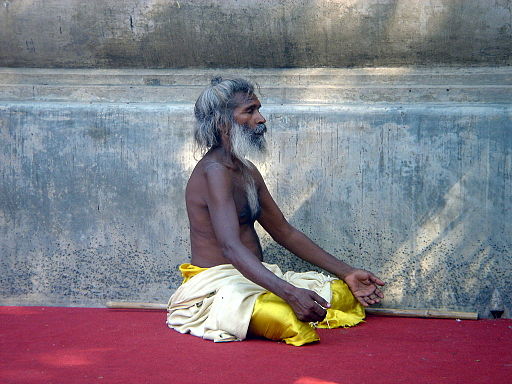
Why do you meditate?
There are many reasons people give for why they sit for meditation.
After over 30 years of practicing meditation, I realized that I had totally confused and distorted the reason I do it. Now I wonder if others have too.
When I first began my spiritual journey, I was very clear about why I chose to sit daily. I was on a quest to experience “Universal Consciousness” and to become one with my true Self. I wanted to be enlightened. And the adventure of that quest was a daily joy. My meditations were juicy—never dry.
Each day when I sat there was a sense of adventure and wonderment. I was filled with enthusiasm for the journey and the goal of meditation on the Self.
The goal of my meditation was not personal stress relief, better sleep, more energy, more mental clarity, and so on. But these were all side benefits. And there was nothing narcissistic or self-absorbed about this added bonus.
Over time however, both in my own practice and in the popular understanding of the reasons to meditate, the zeitgeist has become one of self, not Self.
Just google the question “why meditate” and you will see that many, if not most, results are about reducing stress, improving cardiovascular health, improving concentration, or helping one to relax. It’s hard to find any explanations that even give a perfunctory nod to meditation with a spiritual focus.
In a provocative article in the Washington Post titled, “Mindfulness would be good for you If it weren’t so selfish,” Professor of Psychology, Thomas Joiner, ponders the sheer self-indulgence of what often passes for mindfulness.
“But mindfulness has become pernicious, diluted, and distorted by the prevailing narcissism of our time. The problem has somewhat less to do with how it’s practiced and more to do with how it’s promoted. People aren’t necessarily learning bad breathing techniques. But in many cases they are relying on breathing techniques to deliver magical benefits. And all the while they are tediously, non-judgmentally focused entirely on themselves.”
Clearly, the ancient sages and spiritual masters didn’t anticipate that their voluminous tomes and treatises would be boiled down to stress relief hundreds and even thousands of years later.
I watched a documentary recently called “On Meditation.” In it, mostly well known people talk about their reasons for meditating in a variety of traditions. There were some who spoke of meditation more as a tool for personal self-improvement—something that empowered their worldly endeavors, and even as a less expensive form of psychotherapy.
And there were others, like writer, Peter Matthiessen who spoke of “becoming one” with our true nature and intuiting the true nature of existence. Filmmaker David Lynch talked about meditation as a way to go within and experience consciousness, unity, and oneness.
And one person put it distinctly and bluntly. The Venerable Metteyya Sakyaputta said, “Like Buddha, I want to be enlightened.”
Meditation with a goal of spiritual attainment seems to have gone out of fashion in favor of more practical, secular benefits. I certainly seem to have unconsciously begun to leave behind my higher goals of spiritual attainment for the more mundane benefits of less stress and anxiety, more mental clarity, and better sleep.
And I absolutely can relieve some of the outside stress I feel from world events with a few minutes of meditation daily. I can even lower my blood pressure dramatically by doing some specific pranayama for a few minutes.
But I realized I was no longer truly enjoying my practice. Meditation had become a duty, or even worse, a substitute for anti-anxiety and blood pressure medication. It’s true that I always felt better knowing I could pat my (small) self on the back for having done some useful self-care.
The Dhammapada, the Bhagavad Gita and Patanjali’s Yoga Sutras all speak of controlling the mind in order to be free from the obstacles to the ultimate freedom—nirvana or samadhi. There is no doubt that in the quest for that ultimate freedom, many mundane and worldly benefits will also arise.
It is our awareness of the Self that gets us closer to the goal of meditation. Exchanging our concern for self-care, self-love, and self-compassion for Self-Care, Self-Love, and Self-Compassion opens our hearts and brings us closer to true oneness. We’re moving from our small, limited version of who we think we are and connecting with the more expansive, true reality. It is recognizing that we are individually connected to the whole and the joy that ensues from that awareness, that gives us peace—the promise of meditation.
So with this recognition, I went back to basics. I became the seeker I had once been, and the joy and juice has returned to my meditation practice. I now meditate for longer and instead of being glad when the timer goes off at the end of practice, I am usually surprised and meditate for a few minutes longer.
Once I recognized that I needed to refocus the goal of my meditation practice, one book in particular jumped into my hands. It was written 15 years ago by the former Swami Durgananda, now the well known meditation teacher, Sally Kempton.
The Heart of Meditation is one of the most accessible, heart-centered books on mediation I have ever read. When it was first published, it helped to deepen my experience. Thankfully, it was still on my bookshelf.
“For many people, the first great breakthrough in meditation practice comes when they begin to contemplate the goal…The ultimate goal of meditation is to experience the full unfoldment of our own full consciousness, the inner luminosity, love, and wisdom…called the Inner Self or the Heart.”
We are one with all sentient beings, and recognition of this helps us to experience the love, joy, peace, and compassion that we all crave.
Author: Gayle Fleming
Image: Wikimedia Commons
Editor: Travis May
Copy Editor: Callie Rushton
Social Editor: Yoli Ramazzina








Read 0 comments and reply